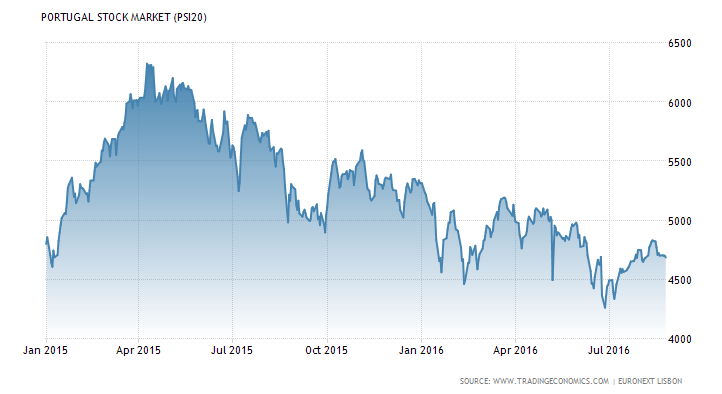
Portuguese Equities Falling On Revived Bailout Concerns.
After receiving a €78.0 billion bailout back in 2011, Portugal has largely managed to avoid much news coverage as troubles in other sovereigns such as Greece dominated the news headlines. However, 5 years of austerity measures have left the country in worse shape as evidenced by 3 of the 4 major ratings companies downgrading the outlook for the nation to junk status. If the last of the ratings agencies was to downgrade the nation’s finances from investment grade to junk, another run on the banking system and higher borrowing costs will be in store for the country. With government bond yields once more on the rise despite the substantial accommodative monetary policy measures in place, the PSI 20 equity index is mirroring the softness in bond prices as investor flight accelerates.
Enduring Austerity Crushes Outlook.
One of the byproducts of the decision to accept bailout funds was the demand that Portugal cut costs in an effort to reduce debt levels. As a result, crippling austerity was enacted across the country, with the government slashing its budget in an effort to bring its finances under control. Although the budget deficit declined to -4.40% in 2015 from -11.20% before the bailout in 2010, debt-to-GDP remains a sky high 129.00%. Additionally, reduced fiscal spending has led to a host of other problems throughout the economy like unemployment which has held above 10.00% since late in 2009. Progress has been made considering joblessness fell from a record high of 17.50% in 2013 to its lowest levels since 2010 alongside a rebound in spending during the same period, but each measure has yet to return to pre-crisis levels.
As a result of weaker government and private spending over the last several years, growth has remained especially soft. Despite the highly accommodative monetary policy backdrop enacted by the Central Bank, financial assets are starting to show increasing distress. Although the ECB is purchasing Portuguese government and corporate debt, they are not meeting targets because of the cap set by the asset purchase rules. In more normal conditions, purchases of bonds would likely help equities rise as investors move money from low yielding assets to assets with higher yield potential like stocks, minimal asset purchases in Portugal have not fueled gains in the PSI 20. Furthermore, should ratings agency DBRS move to downgrade Portuguese government debt to junk status, it could lead to accelerated flight from Portuguese assets like stocks.
The PSI 20 performance over the last year has left a lot to be desired after returning -9.92% during the last 52-weeks, with only 44.44% of components showing positive returns. Banking in particular has faced tremendous difficulties, especially now that interest rates are at record lows. The banking sector, which comprises more than 20.00% of the total weight of the index, has come under serious pressures thanks to a -71.11% loss in Banco Comercial and a -39.41% decline in Montepio over the last 12-months. Hurting the outlook and dealing another blow to confidence is the most recent announcement that Portugal and the EU are being forced to bailout the nation’s largest bank by assets to the tune of €5.1 billion. With no end in sight for banking woes, the silver lining for the PSI 20 over the medium-term will be hard to find.

Technically Speaking.
For over a year now, the Portuguese PSI 20 has been trending lower in an equidistant channel formation after entering a bear market last August. Since then, not even the benefit of record low interest rates and asset purchases has been enough to spur any serious buying pressure. With the index currently trending near the upper channel line, bearish positions ideally initiated at the level should target the lower channel line for an exit. Adding to the bearish bias is the 200-day moving average which is trending lower above the price action, acting as resistance and nearly coinciding with the upper channel line. While this should present any near-term run up in the PSI 20, to continue its downtrend, prices will have to overcome the 50-day moving average which is currently serving as support. If broken, it paves the way for downward momentum towards 4000.00 in the PSI 20.
Looking Ahead
With the ECB running out of Portuguese assets to buy and the nation’s banks once again under serious speculative pressure, the one item that could be the nail in the coffin remains the DBRS sovereign rating review. If they opt to downgrade the outlook to junk status in-line with Moody’s, S&P, and Fitch, the stage is set for a further decline in PSI 20 in a reflection of reduced confidence. However, should the nation manage to avoid another downgrade, there is the possibility that the PSI 20 rebounds modestly should it be able to take out the 200-day moving average. Nevertheless, considering the current environment, the PSI 20 bias remains firmly to the downside as little is done to fix the underlying fiscal and fundamental problems facing the outlook.

Tradersdna is a leading digital and social media platform for traders and investors. Tradersdna offers premiere resources for trading and investing education, digital resources for personal finance, market analysis and free trading guides. More about TradersDNA Features: What Does It Take to Become an Aggressive Trader? | Everything You Need to Know About White Label Trading Software | Advantages of Automated Forex Trading



































